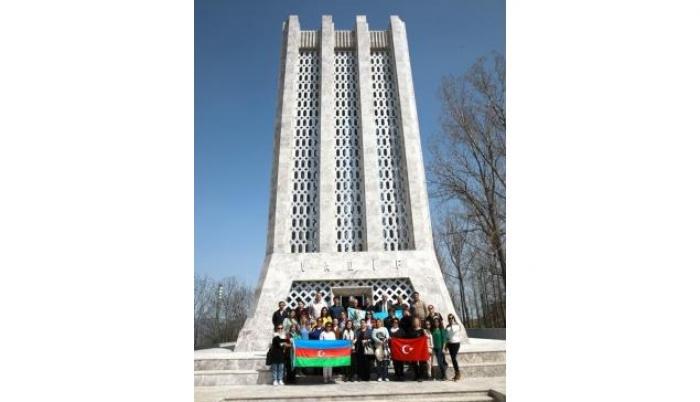
I visited Shusha when I was young. In my memory, the bustling life of the city, its greenery, and the view of the Cıdır Plain filled with people were still vivid. Revisiting the city where my grandfathers, the vizier of Karabakh Khan, Mirza Veli Bey Baharli, and the Qayibovs lived, made me feel excited.
Memories of the first hours when we started our journey from Baku to Shusha with feelings of pride and longing came to mind. Our road was long and exciting. Our trip was outstanding. Because in the past 30 years we have experienced the meeting of sadness and joy, longing and desire, and the victory of the right over the oppressor. We had a lot of losses. We have martyred thousands of heroic children of our country for this land. Our women, children, old people were brutally murdered. We are still unaware of the fate of hundreds of Azerbaijanis. All these losses meant half-lifes, dreams and tears. We experienced these pains for 30 years. In the end, thanks to the wise policy of the Commander-in-Chief and the bravery and determination of our victorious army, we returned to our lands. During these years, thousands of our compatriots lived with the land and died longing for the land. Now those troubled souls found rest in eternity.
We passed through various regions of Azerbaijan to the city of Fuzuli and reached a residential area that was regularly attacked by enemy fire. There was no more danger. Nature and the sun seemed to be rejoicing in the victory of the right. The next stage was more exciting. Because we were advancing towards our liberated lands. To explain the area to us, the tour guide showed us the areas that had not been cleared of mines, which were previously considered neutral zones. The place was still dangerous. But nature showed its beauty to people.
Along the way, we saw the liberated villages of Fuzuli, the district center. Places where there used to be a happy, hot life were destroyed. The enemy realized that the lands were not his, and that the owners would return, and did nothing but destroy what came in front of him.
Feelings of pride and sadness were mixed when the guide showed the villages of Fuzuli, where intense battles were fought and where we gave martyrs. We owned these places again. For this, we are indebted to our deceased heroes and martyrs and their loved ones. We are grateful to our veterans and veterans, to every child of the country who is guarding our land today.
As we progressed, the events of 30 years passed before our eyes. We climbed higher and higher. During 44 days, the suffering and determination of the brave sons of the country were remembered on these roads. Although we did not closely follow those mountains standing behind each other, due to the bravery of our army, those heights, which were considered difficult, were cleared of the enemy. The mountains of Khojavend were a rare beauty. We had encountered a natural gem. The mountains, caressed by the bright rays of the sun, gave peace to the soul.
When the guide showed us the Lachin corridor and Khankendi from afar, we had no doubt that we would soon visit those places as well.
The sad feelings grew even more while passing the road over the villages and forests of Khojaly. Some were saddened by remembering that terrible night and remembering the attempt of people to cross these dense forests for salvation, and some tried to find solace thinking that that terrible night and the revenge of our martyrs was taken by our army.
We were getting closer to Shusha. The devastated landscape of Dashalti, the destroyed Topkhana forest indicated the barbarity of the enemy. Shusha's windings were a special beauty. In the distance, we saw those steep rocks where our army was climbing.
Finally, we reached Shusha, the "conservatory of the East", the cultural center and cradle of music. From the first minutes we entered the city, our sense of interest increased. Shusha himself was the first to greet us with his beautiful nature and sunshine. As if he also missed the owners of the land. Staying at the oil pan hurt him too. No construction or improvement works were done here. The enemy looted not only our lands, but also the construction works we created. 30 years ago, the buildings left by us were dilapidated and dilapidated. But Shusha still fascinated people with her beauty. Because its architect was not man, but nature itself.
The first place we saw during the walk was the Khangizi spring. The water was as cold as ice and clear as tears. When we passed by the ruined and destroyed house of Khurshidbanu Natava, which was considered one of the beautiful buildings of the city and was eye-catching with its ancient ornaments, we once again witnessed the enemy's barbarism.
Shusha Castle still preserved its splendor and grandeur. It seems that during these years, our beautiful city has been a support for it to patiently and steadfastly endure the enemy's trampling until the moment when the right will come. Shusha was welcoming the owners. Everyone was trying to wash away the pain of 30 years of longing with this view.
In the streets of the city, we witnessed the houses destroyed by the enemy and our construction works in response.
